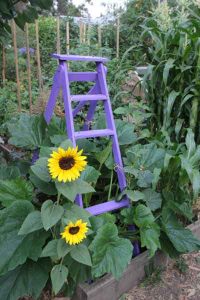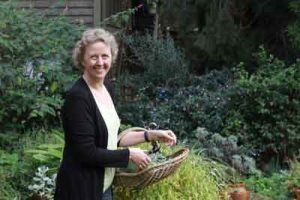SGA chatted with notable organic gardener and author, Penny Woodward, asking her questions about her life and sustainability.
What was Penny’s life before realizing the need to be a sustainable practitioner?
Penny explained that her life was like others’ in the ’70s – about having fun – more about indulgence than being sustainable. But even so, gardening and thoughtful living were never far from her mind. She remembers that she was never extravagant, not into consumption and didn’t think much about buying new clothes – she always wore them until they wore out.
Later, when Penny bought a house and started a herb nursery, gardening became the centre of her life. With her ute she’d head down to Sovereign Hill and shovel horse manure and straw from the stables to enrich her garden’s soil. Once the nursery opened she found that gardening people were wonderful people, and was pleased to be part of this warm and friendly community. Penny particularly liked the way gardeners were respectful of each other, emotionally and intellectually, and generous in sharing plants and food and creating communities around shared experiences.
What made Penny focus on sustainable gardening and, in particular, on organic gardening?
It was having children, Penny elaborates that she suddenly started thinking of the future and the environment in a much more focused way. There were suddenly 1 and then 2 people who would be part of that future and it made a difference – crystallizing awareness. She became even more careful about what she used in the garden and what she brought home. Since her partner suffered from multiple chemical sensitivities, she was also more careful about products such as sprays and cleaners as well as carpets and curtains used in the house. This increased her awareness of how things in the environment can disrupt health.
That also meant thinking about so many other day to day purchases. She laughed that it is only now that there is so much attention on plastic bags – Penny, like many of us, has used hessian or fabric bags for 30 years! And over and over again until they wear out.
She was (and still is) also careful about the companies from which she sourced gardening materials (and many other consumables), she wanted to be sure the companies she supported were good community members. Not only did they need to be organically certified but they also had to have a social conscience. She tries to support companies that reach into their communities by, for example, fostering young people to work, subsidizing a football team, supporting their staff and engaging in a range of important social things – not just making money from their businesses. She finds it a terrific environment to be part of and, to her, that is all part of sustainability. Sustainability is about the whole of life not just about using the right products in the garden.
What challenges were encountered in achieving Penny’s goals in this respect and how did she meet them?

In many ways her challenges are internal, rather than external. Although she is in the public sphere, and gives talks and interacts constantly with people interested in her work, she is not a natural people person. For years she worried that she wasn’t getting involved in environmental and social justice campaigns in a physical sense, but she has learnt over time that you can create change in all sorts of different ways. Her personal mantra is to effect change in her own world and use her writing to reach out to the wider public. Penny says she has become more pragmatic and learnt to do what she can and be more forgiving of herself. She stressed that it is really important to think globally and act locally, even if the saying sounds trite these days. She believes that if everyone does what they can then, together, they can make the world a better place.
What does she think are the most important actions SGA subscribers can take to nurture and protect the planet?
It is to make a difference in any way you can, stay informed and keep learning new things. It may be to act locally, if you prefer to stay-at-home since social media today gives everyone a chance to connect with wider communities. But if you are more of an extrovert, then you can go out and can engage more directly with people and with communities.
One of the small ways Penny tries to make a difference, is by creating a whole environment in her garden. She believes that if everyone was doing that in their gardens right through suburbia, then they would be doing amazing things for the environment more generally and for the world. We should be making compost, having worm farms, planting as many edible plants and also beautiful plants because they are important for pollination. We should be thinking about native bees, bats, birds and preserving spiders. We shouldn’t be killing things in the garden, but encouraging them to interact with other species. Spiders are some of the most important predators, helping keep insects under control, and they can also be beautiful. She recommends having your garden as total environment – even if it’s a balcony or a courtyard.
What are the most important issues in sustainability in general?
Recently she has focused on two matters:
The soil – worldwide
Science is discovering the microbiomes and fungi that exist in soil which are absolutely essential for organic matter and plant growth. This knowledge is gradually spreading into agriculture – it’s being called regenerative agriculture. It’s vital that we find ways to redeem impoverished soils and turn them into living vibrant environments and communities again. This approach to soil helps combat climate change by putting carbon back into soils. Penny says that one person struggles to make an impact on climate change but, when working together and by talking to gardeners about soil, it’s possible to effect change on a broader scale.
Loss of heirloom vegetables and heritage fruit trees

For over 10,000 years, humans have been breeding vegetables and fruit trees, developing tens and hundreds of thousands of different varieties that can be used in different countries and different climates to feed everyone. But since the early 1900’s we’ve lost nearly 90% of those. That’s because of industrial agriculture. There are some that are being preserved in seed banks, but we’ve almost reached the point where something like 80% of all the world’s seeds (that are left) will be owned by 3 multinational companies. Again, this comes back to thinking globally and acting locally. We all need to be saving seeds in any way we can for your local seed bank, and planting them each year. Also planting heritage fruit trees so that they are not lost. And buy from the small companies who work so hard to keep these heirloom and heritage varieties alive. And join the groups that support them. There are some good seed companies in Australia that are buying the heirloom seeds from local seed banks. We need to try to save the 10% that we have left. Penny was horticultural editor, and wrote the introduction to, the ABC’s Organic Gardener Essential Guide – Heirlooms.
Sometimes you read articles that make you feel so sad about the state of the world, but we can all make a small difference if we start acting in small ways. And if you feel like getting involved on a global scale, that’s great, but if that’s not your thing, then start acting locally by changing what’s happening to soil and seeds.
Penny is the horticultural editor of the ABC’s Organic Gardener magazine, the author of 8 books, most recently being a co-author of Tomato know sow grow feast; and by herself Garlic an organic guide to knowing, sowing and using garlic. She also has her own websites at www.pennywoodward.com.au (where you can buy her books) and www.australiangarlic.net.au Find her on Facebook and Instagram.
Related Articles:
Tomato Brown Rugose Fruit Virus (ToBRFV)
Tomato Brown Rugose Fruit Virus (ToBRFV) is a plant virus that causes severe crop losses (up to 75%) in tomatoes, but also in peppers (capsicums and…
Mastering Essential Winter Gardening Skills
As the cold of winter sweep across the landscape, many gardeners in the South of Australia retreat indoors, awaiting the warmth of spring to resume…


